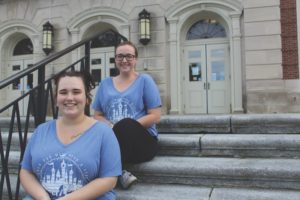Members of the University of Maine community gathered in the cold on Friday, Feb. 1, on the steps of the Raymond H. Fogler Library to witness the raising of the Black Lives Matter flag, an event which marked the beginning of Black History Month, also known as African American History Month, on campus.
Black History Month is celebrated around the nation during the entire month of February. UMaine held its first flag raising to commemorate the event in the spring of 2017.
The flag raising was followed by a gathering in the Memorial Union where members from the Black Student Union and UMaine’s Office of Multicultural Student Life spoke alongside Assistant Vice President and Senior Associate Dean of Students Kenda Scheele.
“This event represents bringing light to injustices surrounding the black community, particularly the injustices that are inflicted [by] the police,” Black Student Union President Taylor Bass said. “It is about unifying our campus in saying that we won’t stand for oppression of the black community, and that the University of Maine cares about their campus being a safe space for the black students that attend.”
Bass touched on the indifference and fears students of color experience every day on and off campus.
“[The event] recognized what has been done not only during Black History Month but instead the majority of the progress we have made outside February. It is to celebrate progress but also recognize the work left to be done,” Bass said to those in attendance.
Kirsten Daley, the previous president of the Black Student Union and a fourth-year anthropology student at UMaine, also recognized the significance of the flag.
“How disappointing would it be to look at a flag like this and think we are done,” Daley said.
Desiree Vargas, a student administrative aid for the Office of Multicultural Student Life, also spoke at the event and had a similar view on the importance of the raising of the Black Lives Matter flag.
“Raising the Black Lives Matter flag on campus today represents how much we still need freedom and justice for all black lives, including women and black LGBTQUIA folks who are often overlooked when celebrating Black History Month,” Vargas said.
Leila Rollins, the vice president of the Black Student Union and a second-year social work student at UMaine, said she is excited for the upcoming events at UMaine to celebrate Black History Month.
“I think Black History Month is a good time for not just reflection into our past but what we need to do moving forward,” Rollins said. “It’s always really encouraging to see how many students come out for it. It’s kinda cool to see how many people are there supporting you, supporting your cause, and celebrating a fun month.”
Amanda Laverdiere, a fourth-year psychology student has many friends involved in the Black Student Union and came to the flag raising to show her support.
“I think for UMaine specifically, we’re a very white-dominated campus and that really silences the voices of many people of color,” Laverdiere said. “And this allows them to show their history and show what should be happening when moving forward, and really gives them a greater voice to show their platform.”
Other students, such as Brianna Neely, a first-year mechanical engineering technology student, came to show support as well as for an opportunity to meet new people around campus.
“There [were] a lot of people there and I was very happy to see the crowd,” Neely said. “It just felt like a great community. Everyone was there for a great purpose.”
Black History Month will be celebrated at UMaine with 13 campus-wide events ranging from workshops, pop up panels, a soul food festival and trivia night.

